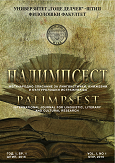INTERCULTURAL DIDACTICS IN THE POETRY OF FEDERICO GARCÍA LORCA: PRACTICAL APPLICATION IN THE CLASSROOM
DOI:
https://doi.org/10.46763/PALIM24918233nAbstract
The present study investigates the integration of poetry into education though application of active and communicative methods. The approach commences with individual text reading and progresses to group discussions and didactic activities aimed at fostering comprehension of cultural aspects within literary texts. Federico García Lorca, a distinguished Spanish poet of the early 20th century, is renowned for introducing neopopular and surrealist literature during the Silver Age of Spanish literature. This article aims to present the cultural element of The Ballad of the Moon, Moon, as a didactic tool in teaching culture within the B language. This didactic proposal enhances reading competence and encourages analytical, reflective, and critical competence regarding literary texts. The focus includes a comparison of gypsy culture in Albania and Spain through a literary and intercultural approach. Students engage in motivational didactic activities crucial for their literary and cultural education.
Keywords: literature; poetry; didactic proposal; Lorca; intercultural communication.
Downloads
Downloads
Published
Issue
Section
License
The intellectual property and copyright on the original content of all scientific contributions in the published paper shall remain with the authors. Authors give permission to the JAPS owner to publish the paper. All authors agree to publish the paper under Attribution-NonCommercial-NoDerivatives 4.0 International license (CC BY-NC-ND 4.0)


